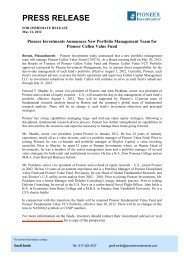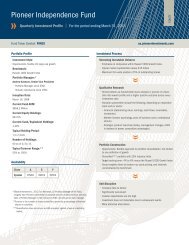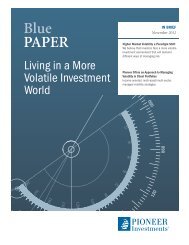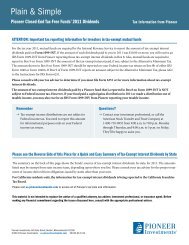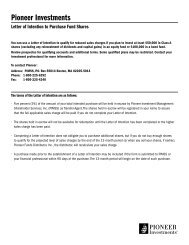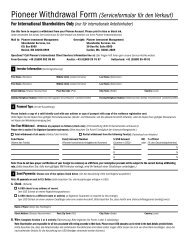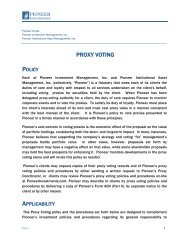Pioneer PRISM XC Variable Annuity - Pioneer Investments
Pioneer PRISM XC Variable Annuity - Pioneer Investments
Pioneer PRISM XC Variable Annuity - Pioneer Investments
Create successful ePaper yourself
Turn your PDF publications into a flip-book with our unique Google optimized e-Paper software.
under the federal Defense of Marriage Act, or any other<br />
applicable federal law. Therefore, under current federal<br />
law, a purchaser who has or is contemplating a civil union<br />
or same sex marriage should note that the rights of a<br />
spouse under the spousal continuation provisions of this<br />
contract will not be available to such partner or same sex<br />
marriage spouse.Accordingly, a purchaser who has or is<br />
contemplating a civil union or same sex marriage should<br />
note that such partner/spouse would not be able to receive<br />
continued payments after the death of the contract owner<br />
under the Joint Life version of the Lifetime Withdrawal<br />
Guarantee (see “Living Benefits — Guaranteed Withdrawal<br />
Benefits”).<br />
Death of the Annuitant<br />
If the annuitant, not an owner or joint owner, dies during<br />
the accumulation phase, you automatically become the<br />
annuitant. You can select a new annuitant if you do not<br />
want to be the annuitant (subject to our then-current<br />
underwriting standards). However, if the owner is a nonnatural<br />
person (for example, a corporation or a trust), then<br />
the death of the primary annuitant will be treated as the<br />
death of the owner, and a new annuitant may not be<br />
named.<br />
Upon the death of the annuitant after annuity payments<br />
begin, the death benefit, if any, will be as provided for in<br />
the annuity option selected. Death benefits will be paid at<br />
least as rapidly as under the method of distribution in effect<br />
at the annuitant’s death.<br />
Controlled Payout<br />
You may elect to have the death benefit proceeds paid to<br />
your beneficiary in the form of annuity payments for life or<br />
over a period of time that does not exceed your<br />
beneficiary’s life expectancy. This election must be in<br />
writing in a form acceptable to us. You may revoke the<br />
election only in writing and only in a form acceptable to us.<br />
Upon your death, the beneficiary cannot revoke or modify<br />
your election. The Controlled Payout is only available to<br />
Non-Qualified Contracts (see “Federal Income Tax<br />
Status”).<br />
10. FEDERAL INCOME TAX STATUS<br />
The following discussion is general in nature and is not<br />
intended as tax advice. Each person concerned should<br />
consult a competent tax adviser. No attempt is made to<br />
consider any applicable state tax or other tax laws, or to<br />
address any state and local estate, inheritance and other tax<br />
consequences of ownership or receipt of distributions under<br />
a contract.<br />
When you invest in an annuity contract, you usually do not<br />
pay taxes on your investment gains until you withdraw the<br />
money, generally for retirement purposes. If you invest in<br />
an annuity contract as part of an individual retirement<br />
plan, pension plan or employer-sponsored retirement<br />
program, your contract is called a “Qualified Contract.”<br />
The tax rules applicable to Qualified Contracts vary<br />
according to the type of retirement plan and the terms and<br />
conditions of the plan. You should note that for any<br />
Qualified Contract, the tax deferred accrual feature is<br />
provided by the tax qualified retirement plan, and as a<br />
result there should be reasons other than tax deferral for<br />
acquiring the contract within a qualified plan.<br />
If your annuity is independent of any formal retirement or<br />
pension plan, it is termed a “Non-Qualified Contract.”<br />
Under current federal income tax law, the taxable portion<br />
of distributions under variable annuity contracts and<br />
qualified plans (including IRAs) is not eligible for the<br />
reduced tax rate applicable to long-term capital gains and<br />
qualifying dividends.<br />
Taxation of Non-Qualified Contracts<br />
Non-Natural Person. If a non-natural person (e.g., a<br />
corporation or a trust) owns a Non-Qualified Contract, the<br />
taxpayer generally must include in income any increase in<br />
the excess of the account value over the investment in the<br />
contract (generally, the premiums or other consideration<br />
paid for the contract) during the taxable year. There are<br />
some exceptions to this rule and a prospective owner that is<br />
not a natural person should discuss these with a tax<br />
adviser.<br />
The following discussion generally applies to Non-<br />
Qualified Contracts owned by natural persons.<br />
Withdrawals. When a withdrawal from a Non-Qualified<br />
Contract occurs, the amount received will be treated as<br />
ordinary income subject to tax up to an amount equal to<br />
the excess (if any) of the account value immediately before<br />
the distribution over the owner’s investment in the contract<br />
(generally, the premiums or other consideration paid for the<br />
contract, reduced by any amount previously distributed<br />
from the contract that was not subject to tax) at that time.<br />
51




